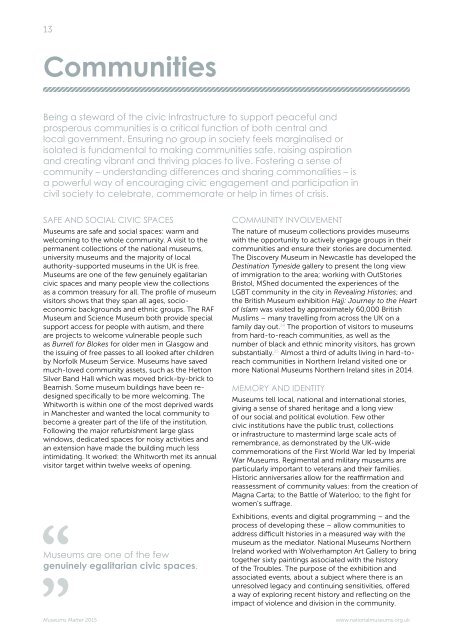Museums Matter
museums_matter_web
museums_matter_web
You also want an ePaper? Increase the reach of your titles
YUMPU automatically turns print PDFs into web optimized ePapers that Google loves.
13<br />
Communities<br />
Being a steward of the civic infrastructure to support peaceful and<br />
prosperous communities is a critical function of both central and<br />
local government. Ensuring no group in society feels marginalised or<br />
isolated is fundamental to making communities safe, raising aspiration<br />
and creating vibrant and thriving places to live. Fostering a sense of<br />
community – understanding differences and sharing commonalities – is<br />
a powerful way of encouraging civic engagement and participation in<br />
civil society to celebrate, commemorate or help in times of crisis.<br />
SAFE AND SOCIAL CIVIC SPACES<br />
<strong>Museums</strong> are safe and social spaces: warm and<br />
welcoming to the whole community. A visit to the<br />
permanent collections of the national museums,<br />
university museums and the majority of local<br />
authority-supported museums in the UK is free.<br />
<strong>Museums</strong> are one of the few genuinely egalitarian<br />
civic spaces and many people view the collections<br />
as a common treasury for all. The profile of museum<br />
visitors shows that they span all ages, socioeconomic<br />
backgrounds and ethnic groups. The RAF<br />
Museum and Science Museum both provide special<br />
support access for people with autism, and there<br />
are projects to welcome vulnerable people such<br />
as Burrell for Blokes for older men in Glasgow and<br />
the issuing of free passes to all looked after children<br />
by Norfolk Museum Service. <strong>Museums</strong> have saved<br />
much-loved community assets, such as the Hetton<br />
Silver Band Hall which was moved brick-by-brick to<br />
Beamish. Some museum buildings have been redesigned<br />
specifically to be more welcoming. The<br />
Whitworth is within one of the most deprived wards<br />
in Manchester and wanted the local community to<br />
become a greater part of the life of the institution.<br />
Following the major refurbishment large glass<br />
windows, dedicated spaces for noisy activities and<br />
an extension have made the building much less<br />
intimidating. It worked: the Whitworth met its annual<br />
visitor target within twelve weeks of opening.<br />
<strong>Museums</strong> are one of the few<br />
genuinely egalitarian civic spaces.<br />
COMMUNITY INVOLVEMENT<br />
The nature of museum collections provides museums<br />
with the opportunity to actively engage groups in their<br />
communities and ensure their stories are documented.<br />
The Discovery Museum in Newcastle has developed the<br />
Destination Tyneside gallery to present the long view<br />
of immigration to the area; working with OutStories<br />
Bristol, MShed documented the experiences of the<br />
LGBT community in the city in Revealing Histories; and<br />
the British Museum exhibition Hajj: Journey to the Heart<br />
of Islam was visited by approximately 60,000 British<br />
Muslims – many travelling from across the UK on a<br />
family day out. 24 The proportion of visitors to museums<br />
from hard-to-reach communities, as well as the<br />
number of black and ethnic minority visitors, has grown<br />
substantially. 25 Almost a third of adults living in hard-toreach<br />
communities in Northern Ireland visited one or<br />
more National <strong>Museums</strong> Northern Ireland sites in 2014.<br />
MEMORY AND IDENTITY<br />
<strong>Museums</strong> tell local, national and international stories,<br />
giving a sense of shared heritage and a long view<br />
of our social and political evolution. Few other<br />
civic institutions have the public trust, collections<br />
or infrastructure to mastermind large scale acts of<br />
remembrance, as demonstrated by the UK-wide<br />
commemorations of the First World War led by Imperial<br />
War <strong>Museums</strong>. Regimental and military museums are<br />
particularly important to veterans and their families.<br />
Historic anniversaries allow for the reaffirmation and<br />
reassessment of community values: from the creation of<br />
Magna Carta; to the Battle of Waterloo; to the fight for<br />
women’s suffrage.<br />
Exhibitions, events and digital programming – and the<br />
process of developing these – allow communities to<br />
address difficult histories in a measured way with the<br />
museum as the mediator. National <strong>Museums</strong> Northern<br />
Ireland worked with Wolverhampton Art Gallery to bring<br />
together sixty paintings associated with the history<br />
of the Troubles. The purpose of the exhibition and<br />
associated events, about a subject where there is an<br />
unresolved legacy and continuing sensitivities, offered<br />
a way of exploring recent history and reflecting on the<br />
impact of violence and division in the community.<br />
<strong>Museums</strong> <strong>Matter</strong> 2015<br />
www.nationalmuseums.org.uk


